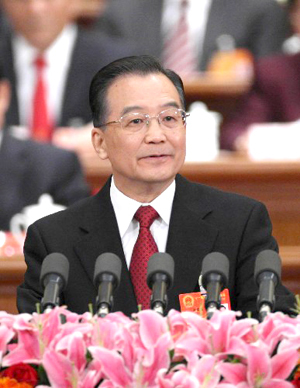Free compulsory education was made available to all rural students, marking an important milestone in the history of the development of education in China. The basic frameworks for a public health system and a system of basic medical services covering both urban and rural areas have been put in place, he added.
But he also admitted that China has experienced overheated growth in fixed asset investment, excessive supplies of money and credit, and imbalance in its international payments in recent years. The current price hikes and increasing inflationary pressures are the biggest concern of the people.
"Both uncertainties in the international economic environment and potential risks have increased," he added.
Under such background, he announced the following targets for economic and social development in 2008: on the basis of improving the economic structure, productivity, energy efficiency and environmental protection, the GDP should grow by about 8 percent, and the rise in the CPI should be held at around 4.8 percent.
Ten million jobs should be created in urban areas, and the rate of registered urban unemployment should be kept at around 4.5 percent. Some improvement should be made in the balance of payments.
After the central economic work meeting, which was held late last year, for the first time proposed the "two prevents", Wen reiterated in the report that the primary task for macroeconomic regulation this year is to prevent fast economic growth from becoming overheated growth and keep structural price increases from turning into significant inflation.

In his 40-page government report, he also talked about energy conservation, emission reduction, environmental protection and ensuring product quality and safety, ensuring the wellbeing of the people and improve their lives, as well as accelerating reform of the administrative system and intensifying government self-improvement.
"Our current plan for the reform of bodies of the State Council mainly centers on changing the way the government functions, appropriately dividing responsibilities among departments that exercise macroeconomic regulation, adjusting and improving bodies in charge of industrial management, and improving departments responsible for public administration and public services. The plan explores ways to establish larger departments that organically integrate the functions of smaller departments," Wen said.
To resolve the problem of overlapping responsibilities and of powers not being matched by responsibilities, the plan clearly defines the responsibilities and powers of each department, clarifies the relationship of responsibilities among departments, and improves the mechanism for interdepartmental coordination and cooperation.